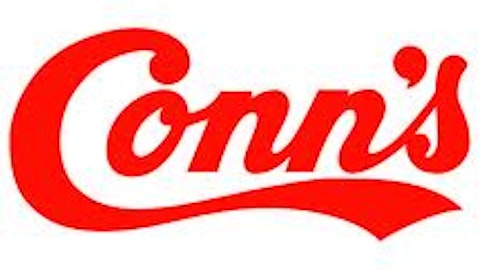
The electronic stores industry has only five players that are publicly listed. Let’s focus on the three largest companies by market capitalization and see which one of them provides the greatest investment opportunity. The three companies are GameStop Corp. (NYSE:GME), CONN’S, Inc. (NASDAQ:CONN) and Best Buy Co., Inc. (NYSE:BBY).
GameStop battling industry trends
The company is exclusively a video game retailer. The company sells new and used video game hardware, used video games, personal computers and gaming software. The stock has climbed smoothly in the last year providing handsome returns for its investors.
Console makers/game developers are lobbying against GameStop Corp. (NYSE:GME)’s used games business. The sales of used games are detrimental to both console makers and game developers as they are missing out on revenue opportunities every time a used game is sold instead of a new one. Microsoft was first to express its disgruntlement with GameStop Corp. (NYSE:GME)’s used game sales. The company announced that its next generation gaming console, Xbox One, would not be supporting used games and the strategy of the company would be to focus on the digital distribution of the games.
At the time of this statement, Sony was also on the verge of launching its rival console, Playstation 4. The company took advantage of the gap Microsoft created with its statement and announced that its new console would play used games. This change was going to be a game changer for the console war between Microsoft and Sony as the public was not ready for such a paramount shift in their game buying attitude. The public pressure finally made Microsoft withdraw its earlier statement and used games are now playable on both Xbox One and Playstation 4.
The public still likes the feel of a game store where they can physically inspect a game and then purchase it. This is the reason why GameStop Corp. (NYSE:GME)’s future still looks intact. At the present moment, the stock seems to be overbought in the market as it is trading near its 52-week high figures I suggest investors to look for a better entry point for this stock.
Conn’s strong growth prospects
The company is a specialty retailer of durable goods targeting US consumers through its network of 70 stores. The company is predominantly based in the state of Texas. The company packs a great potential for growth as the economy of Texas has shown strong growth trends. CONN’S, Inc. (NASDAQ:CONN) benefited from this change as its 1Q13 results showed that the company’s revenue figures increased by 24.8% on the YoY basis. The EPS figures for the company were also higher than the analyst estimates. Another important fact about CONN’S, Inc. (NASDAQ:CONN) is that approximately 50% of the company’s revenues are derived from the sale of home appliances and furniture. These items are the highest margin items that the company sells.
Texas is a vibrant state for investors and entrepreneurs and after the financial meltdown of 2008 the state has shown healthy economic growth. This attracted a lot of businesses to move to Texas. This recent trend will ultimately result in the increase in sales of home office and office products at CONN’S, Inc. (NASDAQ:CONN). Although, CONN’S, Inc. (NASDAQ:CONN) is likely to face competition from Best Buy Co., Inc. (NYSE:BBY), Wal-Mart Stores, Inc. (NYSE:WMT) and Sears, Roebuck and Co., but its superior positioning would allow it to leave the competitors behind. I believe that the company has some massive growth prospects and for that, the company would be a great addition to the portfolios of investors.
Best Buy restructuring for focused growth
Best Buy Co., Inc. (NYSE:BBY) is a retailer of electronic products with a dual (online and brick-and-mortar) presence. The company has shown no growth in its revenues in the last two years. The gross margin figures for the company have been decreasing and it has reported net losses in 2012 period The high long-term debt of the company has made its financial leverage to shoot to 4.91 from a figure of 2.70 two years ago. Best Buy Co., Inc. (NYSE:BBY) needs a solid strategy to change its deteriorating performance.The company has started to price its products more aggressively and its new partnership with Microsoft has potential for increasing the company’s revenues.
The company has been facing tough competition from online-only retailers and because of that it is working on a turnaround plan. Through the plan, the company plans to cut costs by closing stores and investing in employee training. The joint venture with Microsoft will create a store-within-a-store offering. This would attract Microsoft’s loyal customers to Best Buy Co., Inc. (NYSE:BBY), increasing its sales further. The company is adjusting well to the changing technological landscape of the retailing industry and for that reason; I expect the company’s stocks to perform well in the coming months.
Final takeaway
The electronic retail business will definitely benefit from the economic recovery in the United States. Moreover, the dynamics of each retailer have the ability to shape the future movements of the company’s stock price. I expect CONN’S, Inc. (NASDAQ:CONN) and Best Buy Co., Inc. (NYSE:BBY) to produce some solid returns for their investors whereas GameStop Corp. (NYSE:GME) is overbought in the market at present
The article Electronic Stores for Your Portfolio originally appeared on Fool.com and is written by Hussain Asghar.
Hussain Asghar has no position in any stocks mentioned. The Motley Fool owns shares of GameStop. Hussain is a member of The Motley Fool Blog Network — entries represent the personal opinion of the blogger and are not formally edited.
Copyright © 1995 – 2013 The Motley Fool, LLC. All rights reserved. The Motley Fool has a disclosure policy.




